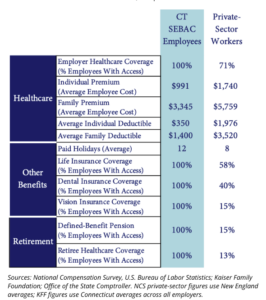On March 6, Gov. Ned Lamont announced that he reached a tentative agreement with the State Employees Bargaining Agent Coalition (SEBAC) — which represents 15 state government unions — that will see state employees benefit from another wage increase as mandated under the contract signed in 2022.
Costing more than $1.8 billion in its first four years, the 2022 five-year SEBAC agreement notably excluded wage hikes for its final year, presenting an initial cost-savings. However, the contract obligated the state to revisit salary negotiations after January 2024 through a mechanism known as a “reopener,” which prompted talks but not necessarily the provision of pay raises.
The fiscal impact of the recent deal remains uncertain. But historical data from the 2022 Office of Fiscal Analysis (OFA) estimated that general wage increases amounted to $85.7 million in the fiscal year 2022, $92.2 million in 2023, and $96.5 million in 2024.
Additionally, annual step increases were estimated at $75.0 million in 2022, $78.4 million in 2023, and $77.2 million in 2024, with no projections available for fiscal year 2025. Along with the pay hikes, SEBAC successfully negotiated for two lump-sum payments totaling $3,500 for the nearly 46,000 employees the group represents.
In a March 6 post by Drew Phelan of SEBAC, the coalition highlighted its efforts in securing a “fair four-year contract,” boasting that the average union member saw wage increases nearing 15%, adding that “doesn’t even include the wage and the reopener in the fourth year.”
Despite the increased wages, Phelan believes there is “much more to be done,” pointing out the ongoing “service crisis” stemming from recruitment and retention issues at various work sites. He noted that full contract negotiations are set for 2025, with imminent discussions on pension and healthcare ahead of the SEBAC agreement’s expiration in 2027.
In other words, SEBAC will be looking for even more from the state’s taxpayers because according to Phelan, “Our state’s working families — and our economy — depend upon a strong, stable, and effective public service workforce. That is only possible with fair pay, decent benefits, and respect for the voices of those on the front lines.”
However, the term “fair” used by Phelan draws attention given that state employees benefit from healthcare, retirement pensions, paid leave and remote work options that surpass those in the private sector.
Furthermore, state employees were shielded from layoffs throughout the pandemic. At the same time, they received raises, pandemic pay and, in many cases, were getting paid to not actually go to work — benefits that far exceeded what many essential workers received. This occurred even as the state’s unemployment rate spiked to 11.6 percent.
The deal, once officially approved, will head to the General Assembly for a vote. It will be interesting to see if lawmakers will increase the state’s fixed costs while taking money away from other essential services.


